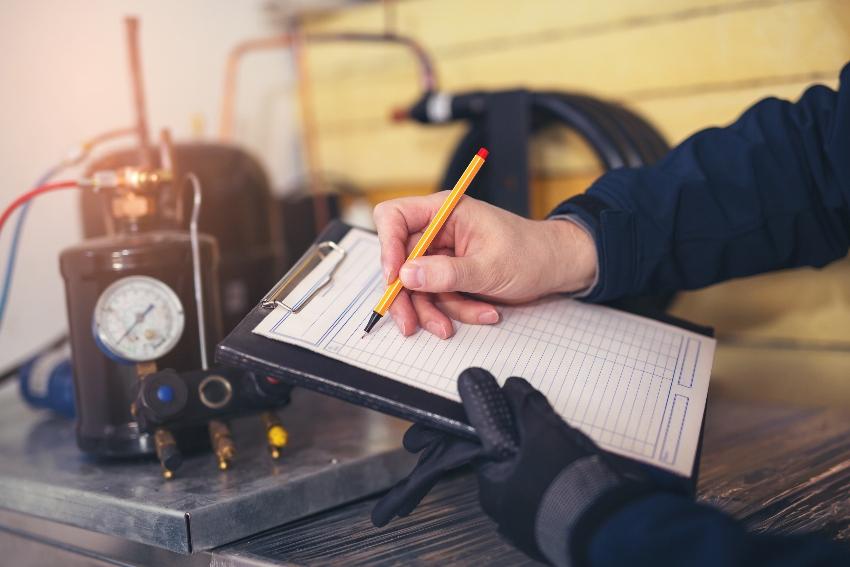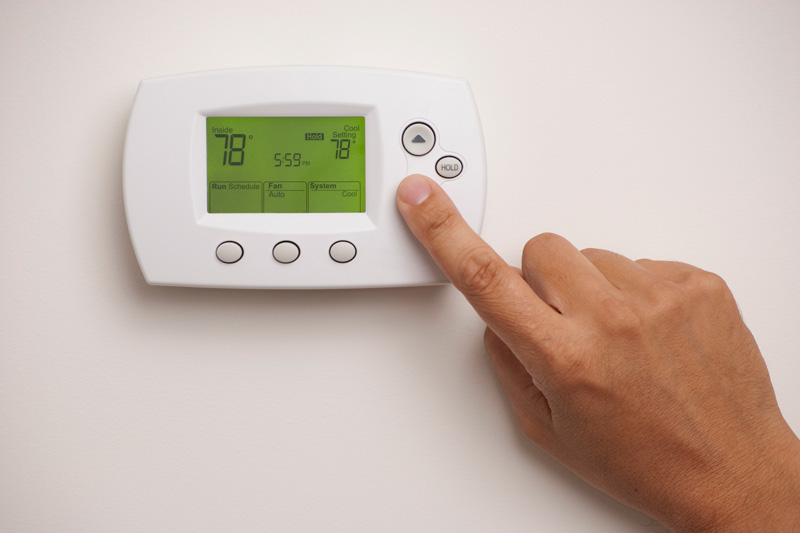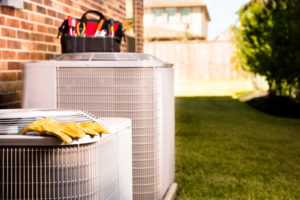Repair or Replace: 6 Signs You Need a New Air Conditioner
Posted on by WestAIR Heating & Cooling

The weather is heating up here in Minnesota. Have you given your cooling system a test run yet? Doing so allows you to address any issues before the hot and humid summer days arrive. But how will you know if you need a repair or a replacement? Read on to learn about six signs you need a new air conditioner.
Frequent Repairs and Old Age
According to the U.S. Department of Energy (DOE), central air conditioners typically last about 15-20 years. And while occasional repairs are to be expected, having to do so frequently means you likely need a replacement. If your AC is around 15 years old and/or needs multiple service calls during the cooling season, it may be time to forget the repair bills and invest in a new cooling system.
Strange Odors and/or Sounds
Your AC shouldn’t be silent, but be on alert for certain noises that point to a problem:
- Loud grinding, squealing, or scraping noises could indicate a faulty belt, which can damage other parts if unaddressed.
- Frequent cycling (system turning on/off) could be caused by an improperly sized unit, a leaky ventilation system, or issues with the evaporator coils.
Additionally, the air pushed out by the system should not offend your nostrils. Don’t ignore strange odors when your AC is on:
- Burning smells may be due to burned-out wiring or other issues with the unit’s internal pieces, which could lead to an electrical fire.
- Foul, rotten egg smells could indicate a gas leak that poses a serious health and safety hazard for you and your family.
- Musty smells could mean moisture is escaping into your ductwork and creating health risks.
If you notice any of these issues, contact WestAIR ASAP to investigate and resolve the issue to keep your household safe.
Moisture Buildup On/Around Condenser Unit
Your AC will naturally produce some condensation, but liquids should never leak from the unit. Pooling water may be caused by a blocked or busted condensation tube and is a less serious issue. However, the refrigerant the system uses to cool the air is poisonous. Contact our expert HVAC technicians immediately if you notice any liquids on or around the condenser unit.
Excess Indoor Humidity
Speaking of moisture, a properly functioning cooling system should help maintain proper indoor humidity levels. If your home feels excessively humid, that’s a sign that your AC is failing and may need to be replaced.
Weak, Warm, and/or Uneven Air Distribution
Air conditioners should supply your entire home with cool, evenly distributed air. Warm air could be caused by a problem with the compressor or restricted airflow. If you notice uneven or weak air distribution from your vents, you may need to change/clean your filter or clean your ductwork to clear a blockage. You should schedule a professional inspection from an HVAC specialist to diagnose the exact cause and discuss the ideal solution to these problems.
Higher Energy Bills
Higher energy bills are to be expected as we increase the demand on our HVAC system during the cooling months. But if your bills seem to spike unreasonably, it’s likely that your AC isn’t operating efficiently and needs to be repaired or replaced.
Rely on WestAIR Heating & Cooling for AC Repair and Replacement
As we prepare for the hot and humid summer days ahead, now’s the time to ensure your AC is ready. Keep an eye out for these signs you need a new air conditioner when testing your system before the cooling season is in full swing. If you notice any issues, the local HVAC experts at WestAIR are here to help.
Contact us to learn more and schedule service.
This entry was posted in AC,Air Conditioning,Cooling,Health Tips,HVAC Maintenance,Indoor Air Quality,Repairs,Tips and tagged AC Repair, AC Replacement, AC Warning Signs, Air conditioner maintenance, Air Conditioner Repair, Air Conditioner Replacement, Air Conditioner Warning Signs, air conditioning, Heating and Cooling Services, Homeowner Education, Homeowner Tips, HVAC Safety, HVAC Warning Signs, Residential HVAC, Signs You Need a New AC, Signs You Need a New Air Conditioner, WestAIR Heating & Cooling
4 Spring HVAC Reminders to Prepare for Cooling Season
Posted on by WestAIR Heating & Cooling

Spring officially began on March 20 and despite some chilly days and “surprise” snowfall, cooling season is on its way. You may be ready for the shift, but is your air conditioner? Use these spring HVAC reminders and tips to help prepare your system for the hot summer days ahead.
Cleaning Tips Around the Home
Whether you’ve already finished your spring cleaning or have yet to bust out the rubber gloves, don’t forget to incorporate your HVAC system into your routine:
- Dust and disinfect floors and hard surfaces around the home. Keeping them clean helps prevent dirt, allergens, and other airborne particles from getting inside your ductwork.
- Clear debris buildup from exhaust fans. After making sure the power is off, wash with soapy water and use a toothbrush to clean dirt and debris off the fan blades.
- Clean windows, blinds, and curtains. That way you can let in fresh air and sunlight without a producing a cloud of built-up dust whenever you open them.
- Dust the blades of your ceiling fans. Similarly, you don’t want dust to fly all over whenever you turn the fan on. And remember to run fans counterclockwise in the summer to blow air straight down and create a windchill effect.
- Clean the grills of floor registers and air vents. Use a vacuum to remove collected dust and debris. For a deeper clean, remove the vent, scrub the individual grill spaces with a rag and butter knife, and then rinse with warm soapy water.
Have your Ductwork Professionally Cleaned
While regular dusting, mopping, vacuuming, and cleaning of the vents and registers helps minimize the amount of debris that gets into your ductwork, there’s no way to prevent it entirely. Duct cleaning helps prevent dust, pollen, and other harmful particles from accumulating and impacting the health of your HVAC system and indoor air quality.
Seal the Home
Don’t let the cool air your HVAC system produces go to waste. Check windows, doors, and exterior walls for cracks and seams that could let indoor air escape and hot, humid outdoor air sneak in. Seal them with caulk to help maintain efficient cooling.
…but Provide Proper Ventilation
Providing fresh air and adequate ventilation are vital to maintaining indoor air quality. Open windows on nice days for natural ventilation and air flow. Consider installing an air exchanger that simultaneously removes stale, recycled indoor air while supplying fresh, filtered air from outside.
Test the System & Schedule Preventative Maintenance
Don’t wait for the first hot, humid day of the year to test your air conditioner. Turn the system on now to check for any issues, and schedule annual preventative maintenance with the local HVAC experts at WestAIR to ensure optimal performance, efficiency, and safety.
With Minnesota’s unpredictable weather, spring can feel like little more than a brief break between the last snowfall and the first hot, humid day of summer. Don’t let the window sneak by without giving your home’s air conditioner some much needed TLC! Use these spring HVAC reminders to help ensure your system is ready to keep your home cool and cozy all season long.
For all your heating and cooling needs, trust the knowledgeable, experienced HVAC professionals at WestAIR. Contact us to learn more about our services.
This entry was posted in AC,Air Conditioning,Cooling,Duct Cleaning,Energy Savings,Health Tips,HVAC Maintenance,Indoor Air Quality,Spring,Tips and tagged Air conditioner, Air conditioner maintenance, Air conditioner tune-up, air conditioning, Annual check-up, Annual service maintenance check, Cooling Season, Cooling Season Prep, Cooling system, Cooling Tips, Duct cleaning, Duct cleaning service, Professional duct cleaning, Spring, Spring Cleaning, Spring Heating and Cooling, Spring HVAC, Spring HVAC Reminders, WestAIR Heating & Cooling
7 Tips for Extending the Lifespan of HVAC Equipment
Posted on by WestAIR Heating & Cooling

When it comes to weather, Minnesota is a place of extremes. Our harsh, bitterly cold winters and hot, humid summer days make a functioning furnace and air conditioner crucial to a comfy home. Follow these tips for extending the lifespan of HVAC equipment to get the most out of your system.
Schedule Preventative Maintenance Twice Annually
Have your system professionally serviced before each heating and cooling season for a thorough tune-up, cleaning, and maintenance service to ensure peak performance and efficiency. Your technician will also catch minor issues to prevent costly repairs later on, as well as help you decide if it’s better to repair or replace.
But don’t wait for maintenance service or a total breakdown to have your system inspected. If you notice strange sounds or smells, decreased efficiency or performance, or any other warning signs, call your local HVAC professionals to diagnose and repair the issue before it gets worse.
Have Ductwork Professionally Cleaned Every Other Year
Dirt, dust, pollen, and other debris naturally settle inside your ductwork over time. This buildup not only impacts airflow and efficiency, but it also becomes a breeding ground for bacteria. As your HVAC unit pumps air to the home, these contaminants get blown out with it and decrease your indoor air quality.
Schedule professional duct cleaning service once every two years to help maintain air quality and reduce stress placed on the system.
Maintain a Clean Air Filter
Clogged filters decrease airflow, forcing the system to work harder and experience a higher level of wear and tear. They’re also the number one cause of breakdowns. Remember to clean or change your HVAC system’s air filter every month.
Take Care of the Condenser Unit
While A/C condenser units are designed to withstand the elements, they’re not invincible. Inspect your condenser for any damage or debris buildup on occasion, especially after severe storms and instances of hail. Additionally, give the unit two to three feet of space to easily and efficiently draw in air. Keep the unit and surrounding space clean and clear of obstructions as well as grass clippings, leaves, branches, dirt, and other debris.
Check the Drainage Pipe Regularly
HVAC systems feature a PVC pipe on the indoor unit that leads outside to drain excess condensation. Serious damage to this outlet line can result in expensive repairs, so inspect yours regularly for blockages, debris, and any other issues. Be sure to do so more frequently in winter due to the potential of ice or snow deposits.
Invest in a Programmable Thermostat
Being strategic with your thermostat can help lower utility bills and stress on your system. However, constantly adjusting the temperature can have the opposite effect. With a programmable thermostat, you can preset temperature and humidity levels over multiple days without worrying about manual adjustments.
Ease Stress on the System in Other Ways
Give your HVAC system a break whenever possible to maximize its performance and useful life. For more information, check out our helpful guides to optimizing HVAC efficiency in the winter and summer.
Heating and cooling systems contribute up to half of a home’s energy consumption, and we rely on them throughout the year in our state. Use this guide to extending the lifespan of HVAC equipment to keep the air in your home clean and comfy for years to come.
Backed by over 30 years of industry experience, locally owned and operated WestAIR has the knowledge and expertise for all your heating, cooling, and indoor air quality needs. Contact us to learn more about our services.
This entry was posted in AC,Air Conditioning,Cooling,Duct Cleaning,Energy Savings,Fall,Furnace,Health Tips,Heating,Humidity,HVAC Maintenance,Indoor Air Quality,Tips,Winter and tagged A/C, A/C maintenance, A/C Tips, Air conditioner maintenance, Air filters, Condenser Unit Maintenance, Duct cleaning, Energy savings, Energy-Saving HVAC Tips, Extending the Lifespan of HVAC Equipment, Furnace Maintenance, Furnace Tips, Homeowner Education, HVAC Education, HVAC Maintenance, HVAC Maintenance Tips, HVAC tips, Preventative Maintenance, Programmable thermostat
Money-Saving Tips to Keep your Home Cool this Summer
Posted on by WestAIR Heating & Cooling
Have you switched your thermostat over to cool yet this spring? When the weather turns hot and sticky, you may be tempted to crank the a/c. Give yourself some peace of mind and follow these money-saving tips to keep your home comfortable this summer.
A/C Maintenance
Avoid an expensive breakdown during summer’s scorching hot days. HVAC technicians are working their peak seasons, so wait times could be longer than you’d like. Instead, schedule your a/c tune-up to keep your air conditioner working at top performance. Technicians will clean parts covered with dust and debris, fill coolant levels, tighten electrical connections, and more. You should always change your air filter every month during cooling (and heating months), too!
Thermostat
Program your thermostat this summer to the warmest comfortable temperature, and even warmer while you are away. However, while you’re away, don’t turn your air conditioner off on extremely hot days. The materials in your home will retain heat, so keeping the room cooler will make it easier for your air conditioner to run. On colder nights, you can turn off your cooling unit and open the windows. Then close them right away in the morning to trap the cooler air inside.
Windows
Use curtains and shades during the day to block direct sunrays from heating your home. Exterior awnings can reduce extra heat by up to 75 percent on west-facing windows! It’s also important to caulk or weather strip any drafty windows.
Air Circulation
Maintain maximum efficiency by inspecting your air ducts for any leaks. Keep cool air circulating in the right areas by closing doors and vents to any rooms not in use. Using an exhaust fan in bathrooms or kitchens also removes heat and moisture from your home, which helps prevent wall damage and mold.
Appliances
Save money on your electric and water bills by less frequent use of appliances that add heat to the house. Avoid using the oven by preparing cold meals or grilling outside on hot days. Air-dry your dishes and laundry. Your water heater is another culprit for extra heat, so try taking shorter and cooler showers on warm days as well.
Plant trees
Planting tall trees can cool your house naturally. Suburban and urban areas are warmer than rural ones because of the heat absorbed by roads, buildings, and parking lots. Planting tall trees to block windows can save you up to 35 percent annually on energy costs while keeping your home cooler and giving your yard extra curb appeal.
Contact WestAIR Heating & Cooling for your annual a/c tune-up and personalized suggestions to keep your home comfortable this summer!
This entry was posted in AC,Air Conditioning,Cooling and tagged A/C maintenance, A/C tune-up, A/C tune-up, Air circulation, Air conditioner maintenance, Air conditioner tune-up, Air ducts, Air filters, Comfortable, Cooling system, Energy efficiency, Exhaust fan, Grilling out, Heating and cooling, Hot days, Humid days, HVAC technician, Plant trees, Summer days, Thermostat, Tune-up, Window curtains, Window shadows, Window tips
A/C Tune-up – Why Should You, When Should You?
Posted on by WestAIR Heating & Cooling
Summer is just around the corner and having a broken a/c is no joke on those scorching hot days.
Why You Need an A/C Tune-up
Give your air conditioner a head start this summer by cleaning the key areas where dust and dirt accumulate. You can reach maximum efficiency by scheduling a thorough tune-up. Maintenance involves a comprehensive cleaning of condenser coils, maintaining coolant levels, calibrating your thermostat, tightening electrical connections, and inspecting the ductwork and performance.
Cleaning
- Condenser coils
- Condenser drain
- Air filter
Testing
- Coolant levels
- Thermostat calibration
- Supply and return temperature differential
- Compressor
Inspecting
- Electrical wiring
- Bearing lubricant
- Safety devices
- Refrigerant
- Indoor coils
- Fan blade
- Test capacitors
- Service valves
- Ductwork
- Blower motor and belt
Regular maintenance will almost always cost less than a repair or a replacement and can decrease your electricity bill. Your cooling unit lasts longer – sometimes twice as long as a neglected one. And to top it off, missing regular tune-ups can void your warranty.
When to Service Your Air Conditioner
Spring is the best time for an annual air conditioner tune-up. Summer becomes one of the busiest seasons for technicians with repairs and emergency service. Waiting until a serious problem develops with your a/c can mean delays in service or additional costs for emergency repair.
Is it Time to Consider a New Cooling System?
Sometimes, it’s worth upgrading your air conditioner system for something that’s more efficient and requires fewer repairs.
If your electricity bill keeps going up without any changing variables like extra hot weather, you might be ready for a new air conditioner. You also need to consider how old your a/c is – most last 10 – 15 years. If your system is unreasonably noisy or dusty, this could indicate that there are leaks in the ductwork or the system isn’t the right size for your home. Lastly, an efficient air conditioner should remove humidity from your home. Any trouble with humidity and inconsistent temperatures where vents are located also signifies a problem.
On our next visit, we can give your current air conditioner an energy assessment to see you need to tighten or clean a few parts or if it’s time to upgrade to a new cooling system. We are proud dealers of Rheem air conditioners – top-quality, innovative products with the latest technology.
Contact us to schedule a service today!
This entry was posted in Air Conditioning,Cooling and tagged A/C maintenance, A/C tune-up, A/C tune-up, Air conditioner maintenance, Air conditioner tune-up, Condenser coil, Cooling system, Heating and cooling, Rheem, Thermostat, Tune-up
Subscribe to Our Blog
With RSS feeds, you don't have to visit our site everyday to keep up to date. Simply subscribe to our blog via RSS or Email and our posts will come to you!
Search Blog Posts
Categories
Archives
- April 2024 (1)
- February 2024 (1)
- January 2024 (1)
- February 2023 (1)
- January 2023 (1)
- December 2022 (1)
- November 2022 (1)
- October 2022 (1)
- September 2022 (1)
- August 2022 (1)
- July 2022 (1)
- June 2022 (1)
- May 2022 (1)
- April 2022 (1)
- March 2022 (1)
- February 2022 (2)
- December 2021 (1)
- November 2021 (1)
- October 2021 (1)
- September 2021 (1)
- August 2021 (1)
- July 2021 (1)
- June 2021 (1)
- May 2021 (1)
- April 2021 (1)
- March 2021 (2)
- January 2021 (1)
- December 2020 (1)
- November 2020 (1)
- October 2020 (1)
- September 2020 (1)
- August 2020 (1)
- July 2020 (1)
- June 2020 (1)
- May 2020 (1)
- April 2020 (1)
- March 2020 (1)
- February 2020 (2)
- November 2019 (1)
- August 2019 (2)
- June 2019 (1)
- May 2019 (1)
- April 2019 (1)
- March 2019 (1)
- February 2019 (1)
- January 2019 (1)
- December 2018 (1)
- November 2018 (1)
- October 2018 (1)
- September 2018 (1)
- August 2018 (2)
- July 2018 (1)
- May 2018 (1)
- April 2018 (1)
- March 2018 (1)
- February 2018 (1)
- January 2018 (1)
- December 2017 (3)
- November 2017 (2)
- October 2017 (2)
- September 2017 (2)
- August 2017 (1)
- July 2017 (2)
- June 2017 (3)
- May 2017 (2)
- January 2017 (4)
- November 2016 (1)
- September 2016 (3)
- July 2016 (2)
- June 2016 (2)
- May 2016 (4)
- April 2016 (1)
- March 2016 (2)
- February 2016 (2)
- January 2016 (1)
- August 2015 (1)
- July 2015 (1)
- June 2015 (3)
- May 2015 (1)
- July 2014 (2)
- June 2014 (1)
- April 2014 (1)
- March 2014 (1)
- February 2014 (2)
- October 2013 (1)
- May 2013 (1)
- March 2013 (1)
- February 2013 (1)
- August 2012 (1)
- July 2012 (2)
- June 2012 (2)
- May 2012 (2)
- March 2012 (1)
- February 2012 (1)
- December 2011 (1)
- November 2011 (1)
- October 2011 (1)
- September 2011 (1)
- August 2011 (1)
- June 2011 (1)
- May 2011 (1)


 Subscribe
Subscribe Subscribe
Subscribe